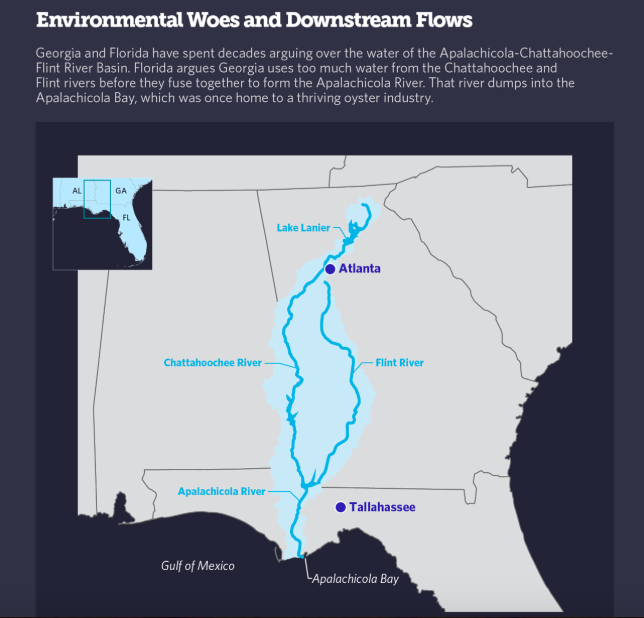Connecting state and local government leaders
The Supreme Court last week seemed to suggest that in water disputes between states, the health of an aquatic ecosystem can be considered alongside drinking-water and farming concerns.
Florida and Georgia have been arguing about the water that flows into the Apalachicola Bay for three decades, about as long as Tommy Ward and his family have been selling oysters from the bay.
Florida says Georgia draws more than its fair share of water from the Flint and Chattahoochee rivers before they fuse to create the Apalachicola River. Georgia uses the water to supply thirsty Atlanta and the vast farmland south of the metropolis. But its disruption of the freshwater flow has increased the salinity of the bay and the number of oyster-eating predators, which are able to thrive in saltier water.
The result: The virtual collapse of the oyster industry in Apalachicola Bay.
Gone is the era when 50 oyster boats could haul in more than 700 pounds of oysters each after a day on the bay. Now the only oysters Ward sells are those he grows in cages. His oyster distribution business, which has been in his family for three generations, has had to diversify, selling seafood generally. “We’ve gone from selling 100 percent oysters to about zero percent to be truthful with you,” he said.
To increase water flow into the bay, Florida in 2013 asked the U.S. Supreme Court to cap Georgia’s water usage at 1992 levels, when the population of metropolitan Atlanta was about half what it is today. Georgia says that its water usage is not responsible for the environmental and economic decline of the Apalachicola Bay.

The Pew Charitable Trusts
During a week filled with U.S. Supreme Court-related news, many overlooked the significance of the ruling the court issued last week in the Florida-Georgia dispute: Taking a rare — if not unprecedented — stance, the court seemed to suggest that in water disputes between states, the health of an aquatic ecosystem can be considered alongside drinking-water and farming concerns.
Florida’s odds did not look good as its case was headed to the Supreme Court. Ralph Lancaster, the special master appointed by the court to oversee most hearings in the case, said that though the bay had been affected by overuse of water upstream, it wasn’t clear that capping Georgia’s water use would solve the problem.
But the justices disagreed, saying Lancaster used too strong a standard in evaluating whether adjustments upstream could solve problems in the Apalachicola Bay. The court remanded the case back to Lancaster who must reconsider Florida’s proposal and evidence.
“Florida is asserting that they want water for fish and fauna, and that’s the first time that’s ever been presented in one of these cases, and that’s what makes it interesting,” said Jesse Richardson, a professor at the West Virginia University College of Law who specializes in water issues.
John Draper, a lawyer who has represented numerous states in interstate water disputes, agreed that going forward, environmental issues “might get some notice and be a matter of concern. It may not decide the case, but it’s come into the mix of what’s likely to be considered by the court.”
Last week’s decision all but ensures the legal saga will continue. Now the task for Florida is to prove how an increased freshwater flow would help the bay bounce back. It hardly guarantees the state a remedy, but it may mark a shift in how lawyers approach water cases as growing populations and climate change heighten competition for an increasingly scarce resource.
It’s been an unusually active time in water law, experts say, with four active interstate water disputes before the court. Such disputes seldom focus on ecology — in most arguments over water rights, states want their fair share for drinking and farming.
Of course, Florida’s concerns are not exclusively environmental. The health of the bay supports an industry that, if not vital to the state, is emblematic of it. Fishing is an economic driver for the region of the Florida panhandle that hugs the Gulf of Mexico.
Some environmental advocates say it makes sense to consider ecological concerns in court precisely because they are so tied to economic issues.
“Ecological function at the end of the day is all about human well-being and economics and the enjoyment of resources, whether that’s enjoying them from an income standpoint like a farmer or fisherman, or recreation standpoint,” said Gordon Rogers, executive director of Flint Riverkeeper, which has been a stakeholder in trying to increase flows along the river and preserve agricultural access for Georgians.
“We’re not hurting the river’s feelings when we’re depleting that flow; we’re harming the people that value that flow.”
The origin of the Florida-Georgia dispute lies north of Atlanta at Lake Lanier, a 59-square-mile body of water about 50 miles from the city, which is managed by the Army Corps of Engineers and supplies drinking water to about 60 percent of Georgia.
The Corps regulates how much water to release, but metro Atlanta and farmers absorb much of it as it works its way south through Georgia. Because the Corps remains in control of much of the water in the system, the special master initially recommended rejecting Florida’s argument, saying the Corps bears much of the responsibility for determining downstream flows.
“A lot of people and lives and economies are at stake with Lake Lanier, and so much is dependent on it, it’s almost like putting all this pressure on something the size of a pinhead,” said Joanna Cloud, executive director of the Lake Lanier Association, which promotes use of the lake as a water source and recreation spot.
Those on the Georgia side point out Atlanta’s water use is minimal — about 1.3 percent of the water in the basin — considering its population and economic importance.
It’s an argument U.S. Supreme Court Justice Clarence Thomas seemed to buy. In his dissenting opinion, Thomas cited figures that the Atlanta area accounts for 98 percent of the population along the rivers and accounts for 99 percent of the region’s economic production.
But Gil Rogers of the Southern Environmental Law Center said that’s the wrong way to view such disputes. “The species downstream is kind of the canary in the coal mine in terms of how healthy the system is for human use and for non-human use,” Rogers said. “It’s a bit of an artificial distinction, because if the waterway is harmed environmentally, it’s either going to be impossible to drink or hard to drink, and it’s going to limit the uses that river can sustain.”

NEXT STORY: Crews Battling Wildfires Won’t Be Pausing for July 4



